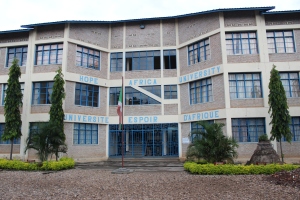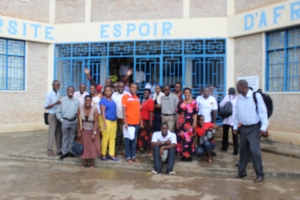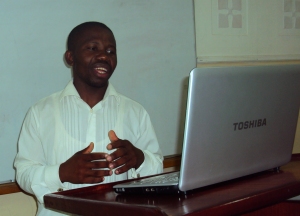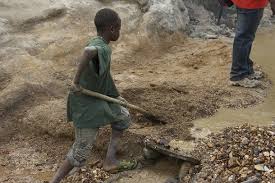Growing up in Fizi, Democratic Republic of Congo, I had the privilege to learn the history of my country and my district. I learnt that Fizi is one of the nine territories of the South-Kivu province in the Eastern part of the DR Congo. The district of Fizi borders with Tanzania and Burundi on the east, across Lake Tanganyika. Fizi is a vast and poor rural area of about 22,000 km2 with over one million inhabitants. The district headquarters (capital city) is also named Fizi, which previously had over 30,000 inhabitants. However, due to incessant wars, the district of Fizi has remained uninhabited for a long time. Throughout history, Fizi has been a battlefield, living the population in absolute misery and poverty. The former President Kabila led an unsuccessful rebellion against the regime of late president Mobutu Sese Seko from 1963-1979. With the support of Rwanda and many other countries, President Kabila led a second rebellion (the so-called liberation war) from 1996-2002 and succeeded in overturning Mobutu’s dictatorship regime (see map from the previous blog).
As a child, my parents, grand-parents, and mentors would share stories with me of what life was like for them between 1963-1979. Even still, I never imagined another war could happen because the area was peaceful and we could move around freely without fear of gunshots or war.
Growing up in Fizi, life was fun as we climbed mango, orange, avocado, and papaya trees-name them all, we enjoyed them. As a child I enjoyed running around the bush and climbing mountains to play with monkeys, and never hesitated to run whenever I smelled gorilla, chimpanzee, elephants, or lions passing by. I learnt as a child to be watchful when walking in the bush as the area was full of deadly snakes. All these experiences became part of everyday life until the day came when shedding innocent blood became the order of the day. This day I will never forget in my life.

Mango tree

Chimpanzees in my home land
October 25, 1996. Although rumours of war spread all over the country, nobody in the Fizi territory believed that they would have to flee for their lives and seek refuge in neighbouring countries. Everyone believed in the army’s ability to secure the land and protect us from any attacks. On the morning of October 25, 1996, I woke up and went to class as usual. Around 11am we heard shootings but the school authorities did not think that it was anything serious until it was too late. Parents came to pick up their children from school as the situation in the area had become fatally violent. Over 5 people were reported killed in the shootings that lasted two hours in the nearby mountains.

Hundreds of thousands of people had to flee for their lives when the war broke out in 1996
Unfortunately, my sisters and I had nobody to pick us up, since my parents lived 60 kms away from our school. We decided to start the long journey home. To our surprise, the streets were full with hundreds of people, carrying luggage and their children, walking or running to unknown destinations to save their lives. All of a sudden, hundreds of military cars appeared on the road, escaping the frontline battle and fleeing with their families. My two young sisters and I were confused, shocked, traumatized to see the unbelievable wickedness of human nature. Shootings, shootings after shootings, dead bodies everywhere on the streets. Walking through the dead bodies was the only option. I thought that at our age, my sisters and I and many other children were innocent – this was no longer true.
Hundreds of children were separated from their parents. I was encouraged to meet other lost children in the bush, and we shared the little we had with each other. We enjoyed chatting and warming each other up as we had nothing to cover up ourselves with. We shared the journey home with two other kids who also lost their parents when someone started shooting at a crowd that was running for their lives. One of the children had witnessed his father being shot in front of him. Needless to say, as the eldest of all, close to 14 years at that time, I became the counsellor and the leader. No one would walk on the main streets as it was so dangerous. We also slept in the bush, at that time not worrying about the deadly snakes and insects, among other dangerous animals. The only thing we worried about was the shooting. I never thought shooting and stepping over dead bodies would become a normal experience at an early age in my life. I guess my beliefs about unfairness and injustice only reflected the brokenness of mankind, greed, and the pursuit for self-fulfilment, etc. War-war-war – I hate you.

Lost children during war-
The next morning, we walked the final 20 kilometers in the bush to arrive at our parents’ house. It was no surprise that the village was so quiet: everyone had run for their lives except a few armed people. I happened to have a house key, so I went in the house and realized my parents had left everything behind. I wondered how they were going to survive. My younger sisters had so many questions for me that I could not answer: Do you think our parents and two other sisters were killed? Do you think we will ever see them again? Do you think God will protect them? Do you think it is fair that they left? Do you think they love us enough? I had no answers to their questions. Growing up in Christian homes, we all had big questions about God’s work or presence in the midst of war. We sang some of our favourite songs and prayed briefly. It was time to decide where to go. The other two children we travelled with through the bush decided to continue their journey with one of their neighbours.
I decided to go back to school with my two young sisters. At this time, I did not know if that was the right or wrong decision. Our journey back to school was chaotic as shootings continued. We also spent two days on the road. I started begging for food and anything for survival. We finally arrived at the school, and no one was there anymore (story to be continued in the next blog).
As I reflect on October 25, 1996 – walking through dead bodies, meeting some other lost kids in the bush, surviving the deadly snakes and ferocious animals – it makes me realize how terrible war is. Although the walk to meet our parents – which proved in vain as no one was home – was a torture, I am learning more that situations in our lives do not just happen for nothing. Through those difficult moments I was blessed by people on the streets who had very little but willingly shared with us strangers. I never thought to become a beggar in my life, but I now realize that the structures we put in place around the world force many to become beggars every day. I am learning that ordinary people, like those people I begged from for food, can make a huge impact in someone’s life. Although these people may not even recall what they did for us – some of them were even shot to death in the war – I live now as a result of their simple act of compassion. I completely feel that the prayers and support of many gave me hope and courage to face every day with confidence. Today I don’t regret my past. I now rejoice in knowing that I can make a difference in someone’s life as many did and continue to do in mine. I see more than ever before now that we can make a difference and change someone’s story today.

My chemistry high school teacher in Nyarugusu refugee camp









 nd gold and other valuable minerals on the roads and riverbanks. As a young child, I had no clue of the various resources that we tread upon in our daily farming and other activities and could not imagine that these resources would one day cause me and many other children to become war children, then refugees. Who would have thought that people around the world would soon lust after them in pursuit of the latest technology?
nd gold and other valuable minerals on the roads and riverbanks. As a young child, I had no clue of the various resources that we tread upon in our daily farming and other activities and could not imagine that these resources would one day cause me and many other children to become war children, then refugees. Who would have thought that people around the world would soon lust after them in pursuit of the latest technology? t on the war in my country and the desperate situation of my beloved family and friends in Nyarugusu, I have come to realize how our resources have brought so much pain, struggle, humiliation and loss to me and my people. I just long for that day when the world will realize that their need for more coltan and other resources has led to killings, rape, and abuse of any kind against me and many Congolese.
t on the war in my country and the desperate situation of my beloved family and friends in Nyarugusu, I have come to realize how our resources have brought so much pain, struggle, humiliation and loss to me and my people. I just long for that day when the world will realize that their need for more coltan and other resources has led to killings, rape, and abuse of any kind against me and many Congolese.
















